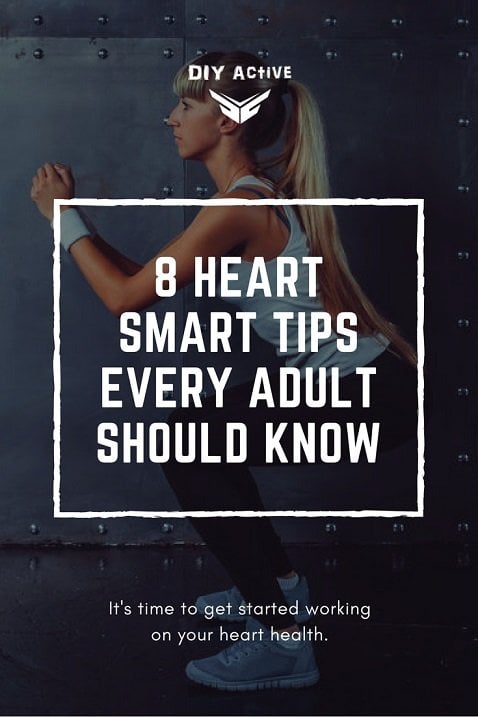
Heart-Smart Tips You Should Know
Keeping your heart healthy isn’t as simple as switching to a diet soda or going for an evening run. There are many factors to consider when working towards and improving your cardiovascular health—and everything from diet to exercise and even sleeping habits can play a part.
Looking for heart-smart tips?
With heart disease remaining the leading cause of death in America, you can’t afford not to think about it.
We’ll be going over a few common-sense heart-smart tips every adult should know in order to keep their hearts healthy—and a few tips you may not have known.
1. Watch your alcohol intake
Many Americans are already aware of the problems associated with alcoholism, but you’ve got more to worry about than a drunken stupor and a regrettable night out.
Alcohol causes two major problems in adults—hypertension and weight gain. While the extra pounds put a strain on your body to provide oxygen to much-needed areas, hypertension can be much worse for you.
High blood pressure can be a factor in a host of heart diseases and can be a primary cause of a stroke or heart attack. Keeping your alcohol intake down will help you keep the pounds off and lower your risk of heart disease.
2. Exercise
 We call certain exercises “cardio” for a reason— endurance exercises such as running and biking will force your heart to work harder and faster.
We call certain exercises “cardio” for a reason— endurance exercises such as running and biking will force your heart to work harder and faster.
Cardiovascular exercises recognize your heart as the muscle that it is—and focus on pushing your heart to deliver as much oxygen to your body as possible. The more cardio you perform, the stronger your heart will be over time.
Consider adding a mile run to your fitness routine, or simply choosing to walk to the store rather than driving.
A little bit of constant motion can go a long way.
3. Get some sleep
Sleep habits and the amount of time you spend in bed each night can have massive implications on the health of your heart, as well as your ability to head out and thrive at the start of each day.
Keeping your heart healthy can be a simple as going to bed on time and consistently.
Studies show that maintaining a regular sleep schedule is actually more beneficial than receiving the recommended eight hours of sleep per night. Sleeping consistently can help with anything from PTSD to warding off unwanted sleep disorders like insomnia or sleep apnea.
4. Watch your stress
Stress is more than a bad day at the office or the headache of noisy neighbors. Stress can manifest itself into dangerous conditions in the physical world.
Unmitigated stress can lead to the development of anxiety disorders, depression, and high blood pressure—which we already know to be a precursor to heart disease.
Being cognitive of the stress in your life and learning when to eliminate unnecessary stress will help you reduce the risk of stress-induced heart problems.
5. Drop the fat
We know that one of the major causes of strokes and heart attacks is a buildup of fat particles in blood vessels, so losing that extra weight is key to improving your cardiovascular health.
Consider developing a weight loss routine if you are overweight or at risk of becoming overweight. Take a two-pronged approach, and cut fats from your diet where you can—including the elimination of fried foods when possible.
6. Keep your doctor in the loop
When undergoing a lifestyle change or making drastic changes to your current level of exercise, be sure to consult with your doctor or physician.
This is especially important if you are currently taking medication that interferes with or works to improve your cardiovascular health. Making the decision to increase strenuous exercise or embark on a radical diet may seem wise on paper, but can have profound and dangerous effects on your body.
Talk to your doctor about any prescriptions you may have, and find ways to minimize prescription costs if possible in order to redirect the money towards a healthier lifestyle.
Some services offer delivery for prescriptions at no cost to you and may help you as you implement your new lifestyle changes.
7. Stay hydrated
Hydration is important to more than just cardiovascular health, but drinking the required 3 quarts per day will keep your heart working to remove toxins from your body.
Consider swapping out coffee for water in the morning, or ordering water instead of a soda during your lunch break. Incremental changes are key to long-lasting success, and slowly shifting towards more water will help you break any bad habits and keep hydrated.
8. Limit your salt intake
Building off of hydration, the final tip on our list is to limit your sodium intake and keep salty foods out of your diet. Believe it or not, there are plenty of salt substitutes you can cook with that won’t compromise flavor.
Your body does need some salt to function, but far more people consume too much salt as opposed to too little. And since excess sodium can cause dehydration, limiting your salt intake will help you keep your fluids right where they need to be.
Wrap-Up
Many of these tips are common sense—but just as many are easier said than done.
Keeping conscious of your need to maintain a healthy heart will help you better implement these tips, and work towards improved cardiovascular health.



